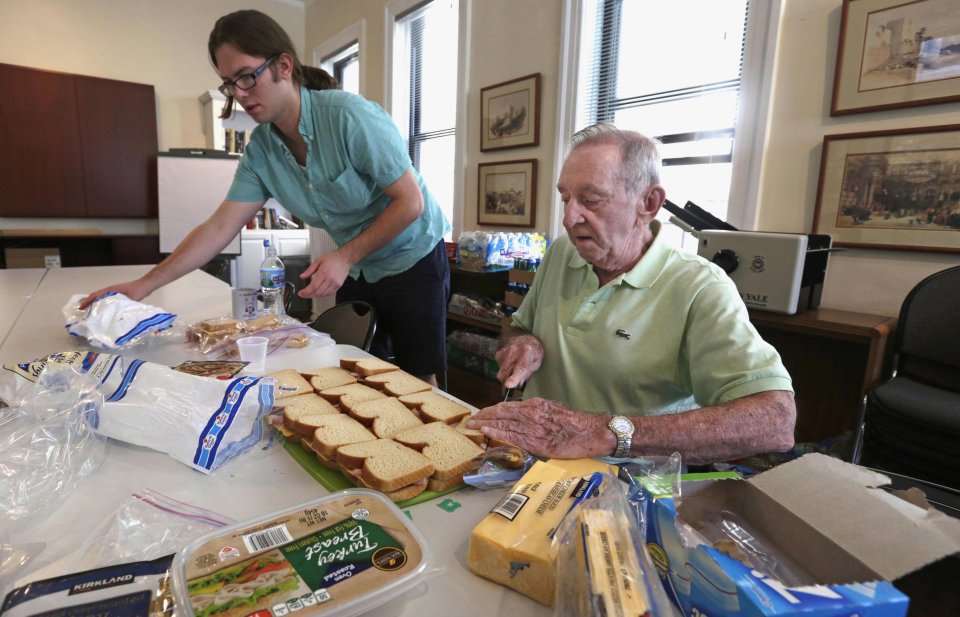
CHICAGO (AP) — They're called "super agers" — men and women who are in their 80s and 90s, but with brains and memories that seem far younger.
Researchers are looking at this rare group in the hope that they may find ways to help protect others from memory loss. And they've had some tantalizing findings: Imaging tests have found unusually low amounts of age-related plaques along with more brain mass related to attention and memory in these elite seniors.
"We're living long but we're not necessarily living well in our older years and so we hope that the SuperAging study can find factors that are modifiable and that we'll be able to use those to help people live long and live well," said study leader Emily Rogalski, a neuroscientist at Northwestern University's cognitive neurology and Alzheimer's disease center in Chicago.
The study is still seeking volunteers, but chances are you don't qualify: Fewer than 10 percent of would-be participants have met study criteria.
"We've screened over 400 people at this point and only about 35 of them have been eligible for this study, so it really represents a rare portion of the population," Rogalski said.
They include an octogenarian attorney, a 96-year-old retired neuroscientist, a 92-year-old Holocaust survivor and an 81-year-old pack-a-day smoker who drinks a nightly martini.
To qualify, would-be participants have to undergo a battery of mental tests. Once enrolled, they undergo periodic imaging scans and other medical tests. They also must be willing to donate their brains after death.
The memory tests include lists of about 15 words. "Super agers can remember at least nine of them 30 minutes later, which is really impressive because often older adults in their 80s can only remember just a couple," Rogalski said.
Special MRI scans have yielded other remarkable clues, Rogalski said. They show that in super agers, the brain's cortex, or outer layer, responsible for many mental functions including memory, is thicker than in typical 80- and 90-year-olds. And deep within the brain, a small region called the anterior cingulate, important for attention, is bigger than even in many 50- and 60-year-olds.
The super agers aren't just different on the inside; they have more energy than most people their age and share a positive, inquisitive outlook. Rogalski said the researchers are looking into whether those traits contribute to brain health.
Other research has linked a positive attitude with overall health. And some studies have suggested that people who are "cognitively active and socially engaged" have a reduced chance of developing Alzheimer's disease, but which comes first — a healthy brain or a great attitude — isn't known, said Heather Snyder, director of medical and scientific operations for the Alzheimer's Association.
Snyder said the SuperAging study is an important effort that may help provide some answers.
Edith Stern is among the super agers. The petite woman looks far younger than her 92 years, and is a vibrant presence at her Chicago retirement home, where she acts as a sort of room mother, volunteering in the gift shop, helping residents settle in and making sure their needs are met.
Stern lost most of her family in the Holocaust and takes her work seriously.
"What I couldn't do for my parents, I try to do for the residents in the home," she said, her voice still thick with the accent of her native Czechoslovakia.
Stern acknowledges she's different from most people at the home, even many younger residents.
"I am young — inside. And I think that's the difference," she said.
"I grasp fast," she adds. "If people say something, they don't have to tell me twice. I don't forget it."
She's different in other ways, too.
"When you get old, people are mainly interested in themselves. They talk about the doctor, what hurts," she said. "You are not so important that you just concentrate on yourself. You have to think about other people."
Study participant Don Tenbrunsel has a similar mindset. The 85-year-old retired businessman doesn't think of himself as a super ager. "Neither do my children," he says, chuckling.
But Tenbrunsel says his memory has been sharp "from the time I was born. My mother used to say, 'Donald, come sing with me — not because I had a good voice, but because I always knew the words," he said. "I think I'm just lucky, not only with respect to my memory, but I'm able to get around very well; I walk a lot and I have a pretty good attitude toward life itself."
Tenbrunsel volunteers several hours a week at a food pantry run by the Chicago church where he is a parishioner. One recent morning in the sun-filled rectory kitchen, he nimbly packaged ham and cheese sandwiches, set out bags of chips and cans of soda, and cheerfully greeted a steady stream of customers.
"Good morning, good to see you," he said, standing at the pantry's bright red door. He gave everyone their choice of chips — a small gesture but important, he said, because it gives them some sense of control over their hard-luck lives.
"I enjoy doing it. I probably get more out of it than I give," Tenbrunsel said.
Ken Zwiener, of Deerfield, Ill., is another super ager. He had "more than an inkling" he might qualify for the study, and his kids encouraged him to enroll.
"They said, 'Dad, your brain is the best thing about you,'" the 81-year-old retired businessman recalled.
He's a golfer and Broadway musical "nut" who created a 300-plus-page computer database of shows. Zwiener uses an iPad, recently went hot-air ballooning and is trying to learn Spanish.
He also pours himself a vodka martini every night and is a pack-a-day cigarette smoker, but says he doesn't think his habits have made much difference. His healthy brain, he says, may be due to heredity and genes, but Zwiener said he hopes the study comes up with more "scientific insights".
"My dad lived into his middle 90s and was pretty sharp right up until the day he died," Zwiener said.
Zwiener's motivation for joining the study was simple: The best man at his wedding died of Alzheimer's disease before age 50.
"To lose a mind ... is just a terrible way to go," he said.
Article is care of:
___
Online:
SuperAging study: http://tinyurl.com/lo75t7b
Alzheimer's Association: http://www.alz.org
____
AP Medical Writer Lindsey Tanner can be reached at http://www.twitter.com/LindseyTanner




















